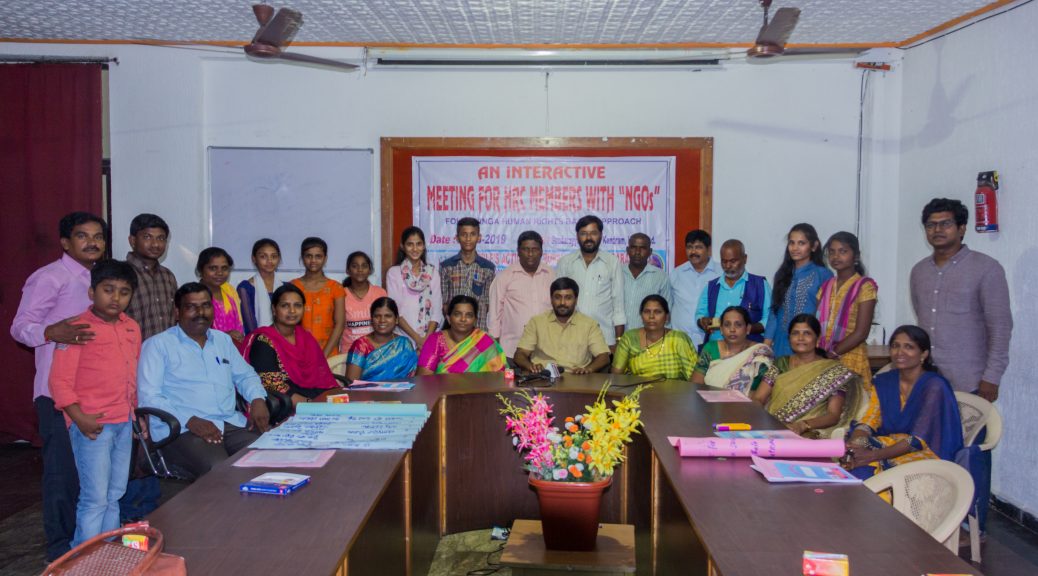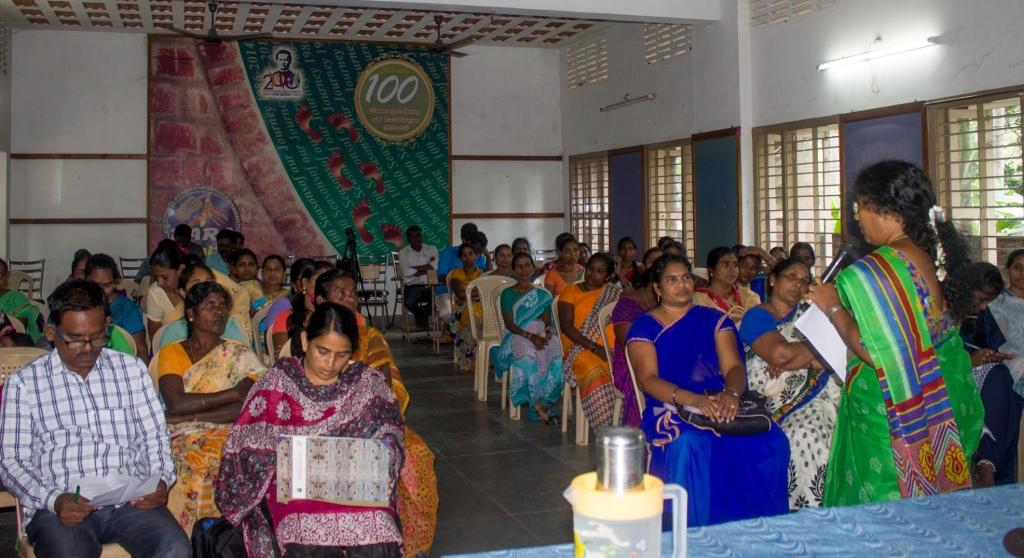Telangana Human Rights Education team of PARA conducted an interactive meeting for old HRC leaders with NGOs on following a Human Rights-based approach. The meeting was held on May 26, 2019 at Sundarayya Vignana Kendram, Hyderabad. The meeting was organised to create a platform for the leaders of Human Rights Clubs who have passed out of school to share their ideas, and to plan their continued involvement in Human Rights activities. Around 30 HRC leaders and representatives from NGOs participated.
Thanking people who work with and represent children, the Hyderabad Child Welfare Committee Chairperson, Mrs Shyamala Devi, expressed happiness over seeing old HRC leaders coming back to take the initiative of Human Rights culture forward. Saying Human Rights are really a call to live more fully as human beings, she asked the leaders to meet regularly and discuss possibilities in their new environments. She encouraged them to use the resources provided by People’s Action for Rural Awakening, Amnesty International and others. She felt that she was understanding more about rights through her interaction with children.
Cautioning that their enthusiasm should not end here with the meeting, she asked the HRC leaders to see that no Human Rights’ violations take place in their specific contexts. She invited them not allow any rights violation go unchallenged. It is everybody’s right to live peacefully. Anyone does not letting others live peacefully is violation human rights. She added that all present should work towards getting the rights of all respected.
Telangana HRE Coordinator S. Ambedkar pointed out that more and more people, busy with electronic gadgets, were forgetting that they are social beings.The Telangana State Coordinator expressed his unhappinessthat many schools in Telangana were not having Human Rights clubs. Sharing a recent experience, he said even Group-II aspirants were not aware of Sustainable Development Goals. The old club members could make people, including their parents and neighbours, aware of these goals.
Saying rights are linked tobasic needs, Mr. Gowtham from Mahita organisation added that, even after 71 years of Independence, people still had fight to get their rights to be recognised. He wanted all NGOs, government officials, teachers, children and parents should practice and respect all rights.
Old HRC leader, and currently a college student, Sowmya Lal Howdekar said that the Human Rights Club members had wanted to stop the marriage of her friend who was still a minor. They were been discouraged by the attitude of management of the school and the parents of the girl. Their efforts along with their class teacher and other students during their visit to the parents of the minor girl were in vain. Though they did not succeed in stopping the marriage, they were at least were successful in bringing the girl back to school.
Sahith Lal Howdekar, another leader, said that there was still so much gender discrimination. Even if girls top the schools, many of them are forced to stop their education after Class-X and are limited to remain in the kitchen.; boys are allowed to continue education even after they fail. Even with all the advancement in technology, when it comes to Human Rights, only few know about them. Sahith Lal said we need to create greater awareness of all rights.
Sharing his experience as a HRC leader, Shiva spoke about the mid-day meal issue at his school. He said his team was turned down several times by the management of the school. However, they persisted and were able to solve the issue. He also said that they also had a water issue. The HRC members solved the issue with the money pooled in the club meetings.
Pooja said that they group was the first and last group of HRC members. Recently they had come to know that a Class-VIII student became a subject to child marriage. On the occasion, she asked the Telangana HRE Coordinator to make the clubs at her school. This was the occasion to revive the Human Rights club in the school.
Saying Child Marriage is an offence, K Sumathi, a resource person, suggested that the leaders to dial 1098 as soon as they hear about a child marriage being planned and to file a complaint. When one cannot handle cases alone, there is the need to explore ways to involve others to find a solution. In anything related to children, anyone could always call 1098 and remain anonymous. Talking about Sustainable Developmental Goals, she said that development should not be done at the cost of others. She took a session on what children could do with regard to the Sustainable Development goals.
In the post lunch a session, the young leaders shared their expectations from the NGOs and the Government. The HRC leaders said that NGOs need to create awareness on Human Rights among children, especially children from the street and promote a human rights culture. To reach masses, cultural teams need to be made active and approach people creatively. They added that the Government need to implement Human Rights Education and Clubs in all schools.


